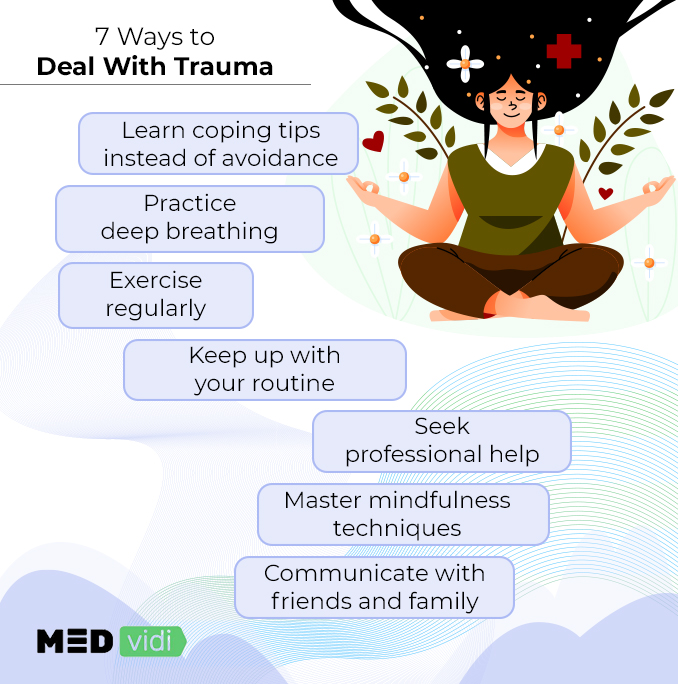Traumatic stress is a common reaction to upsetting events in life. However, this stress lasts longer for some people and affects their relationships and day-to-day activities. According to a
There are more effective ways to cope with traumatic memories and not let them negatively impact your life. Let’s get to the details, so you can learn how to deal with trauma.
What Is Trauma?
Trauma is a psychological and emotional response to a stressful, disturbing, and life-changing event. The American Psychological Association’s (
Traumatic events frequently involve a danger to one’s life or physical safety, but they can also be caused by any circumstance that makes one feel overwhelmed and lonely. Trauma can be acute, chronic, or complex depending on the severity of the event and its frequency (single event or repeated prolonged exposure).
Childhood Trauma
Experiencing a dangerous, violent, or life-threatening event during childhood (
The trauma suffered as a child can have serious and enduring effects. A sense of fear and powerlessness that persists into adulthood creates the conditions for additional trauma. Therefore, it is crucial to deal with childhood trauma to lessen the pain and gain a sense of emotional balance.
Symptoms of Emotional Trauma
The symptoms of trauma can be mild or severe. How someone is affected by trauma can vary according to its type and intensity, presence of other mental illnesses, personality characteristics, and ability to handle emotions.
A patient can experience the following physical and psychological symptoms:
- A state of shock or denial
- Anxiety or fear
- Sleep problems
- Avoidance of places or situations related to trauma
- Flashbacks of the traumatic experience
- Nightmares or dreams regarding trauma
- Repeated and unwanted memories of the traumatic event
- Headaches
- Digestive issues
- Racing heart
Ways to Cope With Trauma
Multiple strategies can help you heal the pain of your trauma and regain emotional and mental health. Some techniques are explained below.
Seek Professional Help to Reach the Acceptance Stage
Coping with trauma is not an easy task. You may experience a wide range of challenging and unexpected emotions, for example, shock, wrath, grief, and guilt, resulting from traumatic stress. Healing requires acknowledging these emotions and giving yourself permission to feel how you feel. Avoiding your emotions and fears can only increase your anxiety.
However, that does not mean that you have to force yourself into the healing process. Give yourself time and be patient with recovery. Allow your feelings to come and face them without being overwhelmed. A mental health professional will make it simpler to go through these phases towards acceptance. You can also break free from the grip of anxiety with the assistance of therapy and medicines, allowing you to resume enjoying life.

Exercise
Even though it may seem odd to you to
In addition to advantages for your physical health, regular exercise can improve your mental health by lowering anxiety and depression. Consult with your therapist to make sure what kind of exercise fits best for your mental and physical health.
Practice Deep Breathing
You can perform this by inhaling deeply until your stomach rises. After three counts of holding the breath, softly let it out. For several minutes, keep concentrating on doing this breathing pattern until you feel your body starting to relax.
Learn to Deal with Trauma Triggers
When something awakens one’s trauma memories, victims get anxious. Even though it’s an unhealthy way, avoidance is typically utilized in such cases. However, learning other coping mechanisms is crucial because we can’t avoid stressors forever. Deep breathing, writing, practicing mindfulness, and self-soothing are all good, healthy coping mechanisms for reducing the impact of triggers.
Seek Support
After a distressing experience, isolating yourself can make your feelings worse. Ask your friends and relatives for assistance. Moreover, you can talk to others who may have experienced the same thing to share some of your emotions. This can help to let your negative emotions out.
Keep Up With Your Routine
A traumatic event may interfere with daily life. Returning as quickly as possible to a regular schedule can help you recover faster. Getting your groove back might assist you in regaining control over your life and a sense of normalcy. People with PTSD, both adults and children, can regain a sense of comfort and stability with structure and consistent schedules. To establish routines, you might assist with chores around the house or shopping, hold regular mealtimes, or come up with other routines.
Be Mindful
Rumination and worrying can be challenged by mindfulness, which directs our attention to the present moment. Overly worrying about the future and dwelling on the past are typically unhealthy thinking patterns. Undoubtedly, it’s necessary to reflect on the past and plan for the future, but spending too much time doing so can make us worried and unhappy. In such circumstances, mindfulness can be a valuable tool for enhancing our present-moment awareness.
The Takeaway
Hopefully, the aforementioned guide has clarified most of your questions regarding how to deal with trauma. Don’t hesitate to seek professional assistance if your stress symptoms are severe and are seriously impairing your ability to function in daily life. For assistance with mental health, contact MEDvidi. We have a group of experts who will treat you in accordance with your needs.













